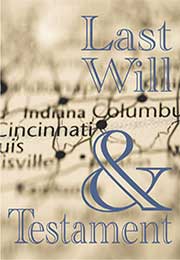Ohio Last Will And Testament
In Ohio a Last Will and Testament (commonly a "Will") is the most well-known way to dictate the distribution of property after one's death.
In the State of Ohio, the requirements to make a will are fairly straightforward. For the most part wills are governed by Ohio Revised Code Chapter 2107.
While there are some nuances, the general requirements for an effective will in Ohio are: (1) a writing; (2) signed by the testator (the person the will is for); and (3) signed by two witnesses.

The first important nuance, in order to have a valid will in Ohio, the testator must havewhat is called "testamentary capacity" at the time of making/signing.
From TV shows and movies, most people are familiar with the idea of capacity in a legal sense, mostly in the criminal cases discussing capacity or competency to stand trial, the idea is essentially the same in the world of wills, albeit the bar is lower for capacity to create a will.
The test to determine testamentary capacity comes from a 1917 Ohio Supreme Court Case, Niemes v. Niemes, and it requires the testator to:
- Understand the nature of the business in which he/she is engaged;
- Comprehend generally the nature and extent of the property which constitutes his estate;
- Hold in his mind the names and identity of those who have natural claims on his bounty; and
- Appreciate his relation to the members of his family.

Put simply, the testator must know they are making/signing a will, have a general understanding of the property they possess, and know who his family is, namely those who would inherit if the testator died without a will (mainly spouse/children). Furthermore, by statute, a testator must be at least 18 years of age.
The writing requirement for a will is obvious and makes sense. Permitting an oral will would create instances where the only witnesses to a bequest would be the person to inherit and a dead person, this is a breeding ground for fraud, therefore oral wills are not permitted virtually anywhere.
What is a Holographic Will and is it Legal to Write Your Own Will in Ohio?
The question of whether a handwritten will is permitted comes up frequently.
In legalese a handwritten will is called a holographic will. Ohio is one of the majority of states that permit holographic wills, provided the other requirements are met, however there are a minority of states that will not accept them, even if they are created in a state where they are permitted.
There are several issues that could arise with a holographic will.
For example, a Dad has two children, Son and Daughter. Son is estranged, so Dad by holographic will in Ohio gives everything to Daughter. Dad moves to New York, a state that does not permit holographic wills.
That holographic will may no longer be valid, and Son will likely inherit even though it's against Dad's intentions. Because of the issues associated with holographic wills, typed wills are best practice.
How Many Witnesses are Required and Do Wills Need to be Notarized in Ohio?
The signature requirements for both the testator and witness are easy to understand. Both the testator and two witnesses need to sign the will. The witnesses need to be at least 18 years of age and need to physically witness the testator's signing. Additionally, it is generally recommended the witnesses be disinterested i.e. not inheriting (even contingently) in the will.

While the will itself may otherwise be deemed effective, any gift to a witness contained in a will, will be deemed void. If that witness were to otherwise inherit under Ohio's intestacy laws, the gift will be capped at that amount (O.R.C. § 2107.15).
In Ohio, a last will and testament does not need to be notarized. While some other states allow for the self-authentication of a will via notary, Ohio is not one of those states.
In summary, to make a will in Ohio it needs to be in writing, signed by the testator with testamentary capacity, and signed by two witnesses.
Wills can range from extremely simple to extremely complex. Interestingly enough, the Guinness Book of World Records notes the shortest will contained only two words. Those words when translated from Czech to English stated "everything to wife."
If this were written on a bar napkin and signed by the testator and two witnesses, this would likely be a valid will in the State of Ohio, however this would be far from perfect and certainly not recommended.
When legal professionals draft wills they consider much more than just disposition of property. A proper will should appoint executors, consider tax consequences, provide for the continued operation of a business for the decedent, and other issues particular to the person for whom the will is written.
Ohio Last Will And Testament - Can You Disinherit Your Spouse?
It is important to address marital property and spousal elective share under a will. There are a few states that remain "community property" states, where generally all property purchased or acquired during a marriage is considered joint property of both spouses. Ohio is NOT a community property state.
Because Ohio is not a community property state, assets acquired during marriage by one spouse are not automatically jointly owned by the other spouse. This can create some outcomes that go against public policy. For instance, in Ohio, a spouse could completely disinherit the other spouse.

This is why under Ohio law, if a spouse is disinherited or "under-inherited" by their deceased spouse's will, subject to certain provisions of the Ohio Revised Code, the disinherited spouse can choose to make an election against the express terms of the will to receive his or her "spousal share".
Generally speaking:
- If the decedent has only one surviving child and that child is from the marriage, or there are surviving lineal descendants of that one child from the marriage, the surviving spouse is entitled to half of the decedent's estate.
If there are two or more surviving children, or there are surviving lineal descendants of two or more children, the surviving spouse is entitled to one-third of the decedent's estate.
This applies if the surviving spouse was completely disinherited or was to inherit an amount less than the one-half or one-third spousal share, depending on the circumstance.
With that said, if the surviving spouse elects against the will for his or her spousal share all gifts to the surviving spouse under the will shall fail.
This is best demonstrated by example, say decedent (Husband) has a $300,000 estate, a surviving spouse (Wife), and two surviving children (both of the marriage):
- Husband's will gives Wife a car valued at $20,000, and the rest of the estate to the children.
- Wife, in this instance, can make a spousal share election.
- Said spousal share will be $100,000, however if she makes this election, the gift of the car will fail.
Wife may still end up with the car through the probate process though, and the value of the car will count towards her spousal share.
Can You Avoid Probate?
While wills are the most common estate planning devise, they are not the only one. There are several strategies and approaches to estate planning.
One frequently used, and sometime misused, devise is a Transfer on Death Designation (TODD), sometimes called Payable on Death Designations (PODD). These are often seen on bank or other financial accounts and real estate.
TODDs and PODDs transfer the property immediately upon the death of the grantor to the beneficiaries. Property that is subject to a TODD/PODD are not probate property and will not be subject to a will.
There are several pitfalls and things to keep in mind when using a TODD/PODD, especially when it comes to real estate (see more here), which is why it is important to consult an estate planning attorney to determine if that option is appropriate for you.
Ohio Last Will and Testament or Living Trust
Another frequently used device to avoid probate is a trust. Trusts come in many different shapes and sizes and can be used for different purposes.
One can create a trust while they are living (living or inter vivos trust) or by provision of a will upon the death of the decedent i.e. a testamentary trust.
There are several benefits to creating particular trusts as they can be used for asset protection, probate avoidance (probate is the process in which a will is submitted to the county probate court to distribute assets in a will, or if the person dies without a will), or keeping a ne'er-do-well child from blowing their inheritance upon receipt, among other reasons.
How Much Does it Cost to Make a Will or Create a Trust?
Both wills and trusts are legal documents that will be drafted based on the individual needs of the person and should be prepared by a legal professional.
Attorneys will typically charge somewhere in the hundreds of dollars for a will and in the thousands of dollars for a trust. It is impossible to put a blanket price tag on either though, because each requires knowledge of the individual client situation and assets being handled. Trusts are typically more in depth and require more planning and preparation.
Some often get scared away by the upfront costs of a trust as compared to will, however considering long term costs, a trust is frequently worthwhile.

This is especially true if one of the purposes of the trust is probate avoidance simply because probating a will costs money.
Depending on the assets, it can cost a considerable amount of money to probate a will.
Transferring assets through a trust is generally much less costly than transferring assets through probate.
It is never too early to think about your estate planning, and it is highly recommended you seek professional legal advice when doing so.
An estate planning attorney can help assist in determining which estate planning device (will, trust, TOD) or combination of devices is appropriate for you, and what will preserve the most assets or best effectuate your after-death intentions for your assets.
The author of this article on the requirements for a Last Will and Testament in Ohio is Nathaniel E. Spitler, Managing Partner at Spitler Huffman, LLP. His practice areas include Wills and Trusts, Probate and Estate Planning.
Additional information:
Review our guidelines on how to write a will and make use of our free Last Will and Testament templates to streamline your thoughts regarding your executor, guardian and bequests in preparation for your consultation with your attorney.You are here:






